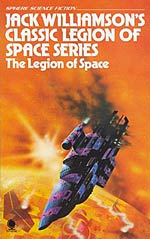
![]() chuhl
chuhl
9/2/2012
![]()
I'm a big fan of space opera, but I've never read E. E. "Doc" Smith or Jack Williamson because I've always heard that, although their importance in the genre's history is undeniable, their prose style is an ordeal for modern readers. So I took advantage of the GMRC to try Williamson's The Legion of Space.
Yes, the prose does tend towards the purple end of the spectrum. It's formal and intense and rather melodramatic by our standards. But if you‘re willing to give it a chance, you find yourself in the hands of an author who's clearly having fun trying to dazzle and horrify you with the wonders and terrors that our heroes face in their quest to save the solar system from destruction. It's like when someone tells you a ghost story around a fire. You can roll your eyes and hang on tight to your disbelief and sneer, or you can get into the spirit of the occasion and have fun with it. If you meet him halfway, Williamson's writing can be very vivid and suspenseful and powerful.
For example, here's an excerpt in which our four heroes, having crash-landed on a hostile planet, find themselves adrift on a log that isn't as safe as it first appeared. At the other end of the log they see a slimy creature that looks like "a gigantic amoeba":
"Slowly, with baleful, unknown senses, it became aware of them. Semiliquid streams began to flow within its formless bulk, as they watched in puzzled horror; it thrust out extensions, flowed into them, and so began an appalling march down the log, towards them...
The four men, naked, exhausted and defenseless, sat on their own end of the log, watching thin green arms thrusting out, and slow streams of semifluid jelly flowing to swell them. The whole hideous bulk never seemed to move, yet was ever nearer.
How would it feel to be engulfed in it? To be seized by the shapeless, creeping arms, drawn into the avid, boneless mass, inch by inch, smothered and consumed? John Star caught his breath, and tried to shake off that hypnosis of slow horror, and peered around him desperately."
Williamson's use of color is especially striking. Many scenes have a cinematic vividness, but you can't imagine this story as a black-and-white movie; it's more like 1950s Technicolor. Lurid reds and yellows, rich purples and sickly greens and impenetrable blacks are mentioned over and over again.
The characters are a bit earnest and stiff. Essentially they're the Three Musketeers in Space. With all the seriousness and intensity in this story, we need some comic relief, and there's where Giles Habibula comes in. He's a gluttonous whiner, presumably inspired by Shakespeare's Falstaff, but before long he reminds you more of Dr. Smith from Lost in Space. He's constantly, helplessly whining about being tired and hungry and thirsty and cold and unappreciated and his complaints are so repetitive that I can't imagine how the other Legionnaires refrain from telling him to shut up, already!
Repetition is the problem with The Legion of Space. Since the novel was assembled from serialized episodes, I suppose a certain amount of repetition is unavoidable, but there's more to it than that. Everything takes place at fever pitch. Everything is always dialed all the way up to 11, as they'd say on Spinal Tap. For instance, here's an excerpt from a scene in which our heroes are making a dangerous passage through a nebula:
"Red agony surged against his brain. Every limb and tissue shrieked. Even the cells of his brain itself, he felt, screamed protest at this consuming radiation. Every second he thought he had felt the ultimate agony, and every second the agony increased.
He was blind with pain. Pain roared in his ears. Red-hot needles of pain probed every fiber of his body. But still he fought to keep the mastery of himself."
There are many, many scenes like that, coming fast and furious. You quickly become desensitized and then you start to feel the cells of your own brain shrieking protest at having to read yet another passage like that for the umpteenth time.
Since the story was originally serialized in Astounding, I found that that's the best way to enjoy it: in small doses, as if you had to wait for the next issue to continue the story. If you try to barrel through it in a hurry, the repetition and the unrelenting fever pitch will exhaust you. But if you ration it out, you'll be surprised at how gripping and vivid it can be. Do I dare try "Doc" Smith next?